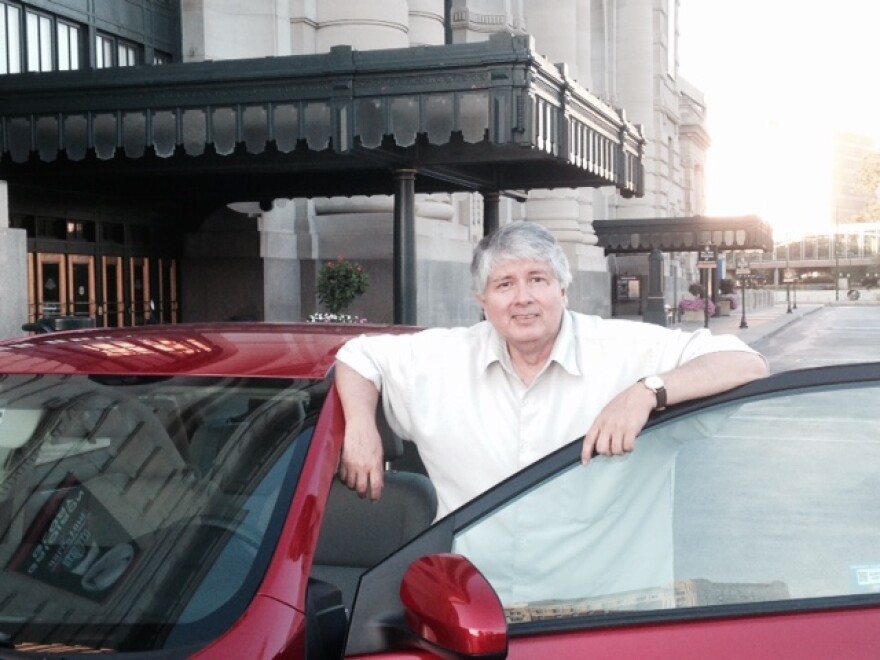My colleague, Donna Vestal, and her husband Eric like living in the Northland.
They have space. Their expansive backyard spills down from their deck like their own personal park where they enjoy a rural kind of quiet.
They like their living situation well enough to endure what can easily be a 30-minute commute daily across the Missouri River.
To save gas, Donna and Eric frequently commute together. He works downtown and she works at KCUR in Midtown.
Commuters have a handful of options for which bridge to use, among the most popular being the Christopher Bond and Broadway bridges.
Eric and Donna use an app on Eric's smartphone to map their route day to day.

"How's it look today?" Donna wonders, as they make their way south toward the river.
"There’s a red line over the bridge ... it’s backed up," Eric replies.
"Looks like an accident on the Bond bridge ... go Broadway," Donna says.
The Vestals see some perks to their commute — they enjoy watching the river rise and fall with the rains; occasionally they get to see eagles; Donna can monitor the airwaves of the radio station where she works.
But at times, the river can feel like a trap.
"We have been stuck going home," Donna says. "It can be really frustrating, because you know you have to get over the water."
Then there's John DeSoto. He's a volunteer at Union Station and is pretty much always delighted with his commute home.
He lives way in the northeast corner of Kansas City near Liberty, Missouri.

His strategy is to avoid the most heavily traveled highways and bridges and take city streets from Union Station to the Heart of America Bridge.
"You'll be able to see ... cars over there ...on the other bridges ... just (waiting in traffic) and sitting around," he says.
Here’s the thing about DeSoto. He doesn’t cook, so he plans his route home based on what he feels like eating for supper.
"We’re gonna be passing up real icon of the Northland when get to Vivian and Antioch," DeSoto says.
"Hays Hamburgers And Chili. I mean you go in there in July, a hot day, and people are ordering their chili," he says. "Boy, it's something else."
Tonight, DeSoto's commuting home to the Northland, but it may surprise you to know that the fastest growing group of Northland commuters are those coming to the area — for jobs.
According to the Mid-America Regional Council, since 1990, there's been a 50 percent increase in the number of people commuting into the Northland for work.
That’s compared to a 42 percent increase in the numbers who commute out of the Northland, mostly south of the river , into Jackson County.
Commercial , residential and business development is booming up north with latest U.S. Census figures showing Platte County as the fastest growing county in the area.
But for some, the commute across the Missouri River – coming or going — is intolerable.
Sitting in a coffee shop minutes away from their home, JoLee Juergens calls it a "soul-sucking" experience.
"To me, I’d rather spend that time at home rather than sitting in my car frustrated and angry," she says.
"I can’t tell you how many times I’ve seen people posting pictures on social media, saying 'ugh'- this commute,' or 'there's an accident or construction.' Yes, it sucks the life out of you," she says.
Juergens and her fiance, Doug Christian were high school sweethearts in Excelsior Springs. When it came time to buy a house, they looked a few places up north, but decided it cost too much - not in dollars but in time.
Christian says it was a quality-of-life issue.
"You just find so much of your time goes to small things. You get 'nickled and dimed' all the time," he says.
"Yeah, to add that 30 minutes or an hour … that commute," Juergens says, "it just eats away at you."
The industry and trade that grew around the Missouri River has been key to the growth of Kansas City since the first French fur traders settled there in the early 1800s.
But with the mushrooming development up north today, the Big Muddy may be exacerbating a divide.
Here’s an interesting statistic — the second fastest growing group of Northland commuters are those who commute within the Northland — ignoring the Missouri River all together.
This look at the Missouri River is part of KCUR's months-long examination of how geographic borders affect our daily lives in Kansas City. KCUR will go Beyond Our Borders and spark a community conversation through social outreach and innovative journalism.
We will share the history of these lines, how the borders affect the current Kansas City experience and what’s being done to bridge or dissolve them.





